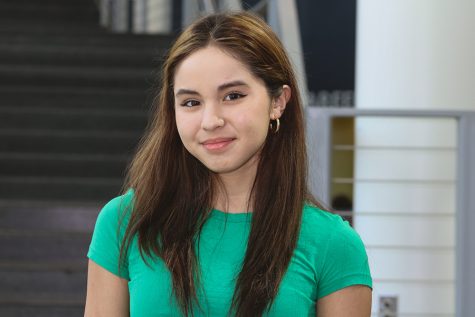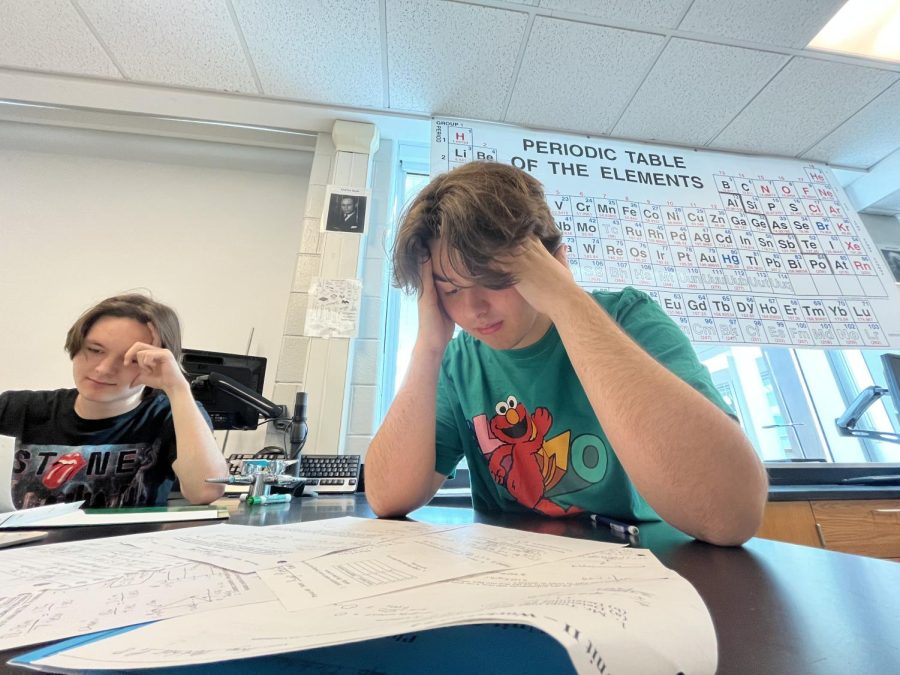Why DGS needs a science resource center
Senior Hugo Pletcher struggles with understanding his physics homework and gets stuck on a problem.
Science has and will continue to be a big part of our world. It is also a big part of DGS, which is why having a science resource center could potentially be extremely helpful.
I have always been a major science lover, taking six science classes here at DGS. It’s undeniable that science is one of the most known and simultaneously unknown fields of study: it’s fascinating. But something I always wished that would help my love for science thrive is a science resource center.
DGS currently has resource centers available for subjects such as math, english/social studies and world language. But having a resource center for science is where things tend to get a bit trickier than what a person may initially think.
After talking to Karen Eder, the Department Chair of science, she explained all the issues that could arise from trying to implicate this kind of institution for students.
“We have explored possible ways that DGS could run a resource center for science which has proven to be pretty tricky….facilities and staffing becomes an issue. If a student comes into a space to work on making up a lab it could be difficult because each class requires different kinds of lab equipment. As for the staffing issue, we have a really amazing staff here but an issue that could arise is if for example a biology student is in need of help, it would be easier for a student to get help from a biology teacher then a physics teacher. Which is all why it’s a bit trickier to staff a science resource center,” Eder said.
For a lot of students, finding time to get help can be difficult. With a subject that is already hard to comprehend on your own, students often feel the weight of trying to understand all of the information on their own if they aren’t available for their teachers’ office hours.
Senior Priya Patel is currently enrolled in AP Biology this year and wished that there were more resources available for her to get help.
“I have a job and am involved in activities so I am not able to stay after school most of the time. Mornings are also a hard time for me to get help because I carpool and always arrive at school around 8:15. AP Bio can be difficult and it’s hard for me personally to find a time to get homework help or to receive clarification on something that is not making sense to me,” Patel said.
For many students, getting help before or after school is not an option. So this proposes the question, what is an option?
To help students that struggle to find time in their schedules to receive extra help, or for students who prefer to work in an environment that thrives on the learning of science; implementing a science resource center would be a perfect solution to take care of the needs of all individuals.
Chemistry teacher Jennifer Fischer agrees that having some sort of resource center dedicated to science would not only help students, but also could in turn help teachers as well.
From my experience as a senior, a lot of students are hesitant to go seek help from their teachers. Having an environment like a resource center where there’s less pressure, and people can come on their own creates more comfortability for a lot of students. Additionally, a resource center also creates a space where you can collaborate with others who take the same classes as you.
Senior Kristina Treibachs also agrees that having a science resource center could be beneficial due to the positive nature of it.
“Although I personally will probably not be able to use the science resource center if one is made because I am a senior, I would love for future students to have this opportunity. I remember freshman year biology class was difficult for me and having a relaxed setting where I could go to get help with friends would be nice. I also feel that it would be beneficial because I would get to learn from a different teacher and sometimes hearing the same thing in a different way is a great way for students to understand things better and just reinforce what they were already taught,” Treibachs said.
It’s undeniable that the student body at DGS sees this need and wants to fill it. The how is what must be figured out next.
To debunk some of the issues talked about earlier in the article, the science resource center could run very similarly to the other resource centers at our school, where each teacher is assigned at a certain period to be there.
In addition to having staff there, having peer tutors to help students would also be incredibly helpful. Having upperclassmen students who are in an AP class would be able to help the underclassmen who are in the 300 or 400 level for that class.
Similar to the math resource center, if DGS would be able to hire one staff member to work exclusively in the resource center that has a well rounded knowledge on chemistry, physics, and biology, they could be a large help to all the students, but more specifically the ones in APs of that class.
Fischer also talked about finding ways to counteract the potential staffing issue and how she can still find ways to help them.
“Even if a student came in needing help for a subject that I don’t teach, I might not know exactly what they are doing, but I can help ask questions and get them to use their resources that they have and just kind of be a guide, which is something that I have done for years in the AVID program… so I think some of these issues aren’t big enough to stop us from having a resource center,” Fischer said.
As for the facilities issue, instead of having to buy all new lab equipment to fill up the science resource center, the space could be used more as a help center where you come to get help on problems or have concepts that need to be explained.
The Head of the Science Department Karen Eder also talks about what her plan is for getting student reflections and feedback to try and figure out what will best help the science students of DGS.
“My hope is that it’s in the reflections that we see about the new schedule that we could gather some student feedback about the value of the current open resource centers and what kind of supports that could be available during resource blocks. The hope is that with teacher office hours and autonomy days that students have more access to science teachers. But maybe in our district reviews of whether that is enough, if that is something that our students share, that maybe that could be something that our district could do in the future,” Eder said.
Science has changed the way that we see the world. It’s been a critical part in understanding just about everything and every process that happens around us.
We have no idea what the future will hold for DGS. Coming up with a plan to address all of the issues is going to be the hardest part if we were to have a science resource center.
If you have a plan of action idea that you think would work well, email keder@csd99.org to see if your idea could be a potential solution.
Hopefully in the future, DGS will hold an overall space dedicated to a science resource center.
Regardless, DGS offers times for students to get help from their teachers, so take advantage of all of those opportunities. The staff is incredible and here to help you always.


